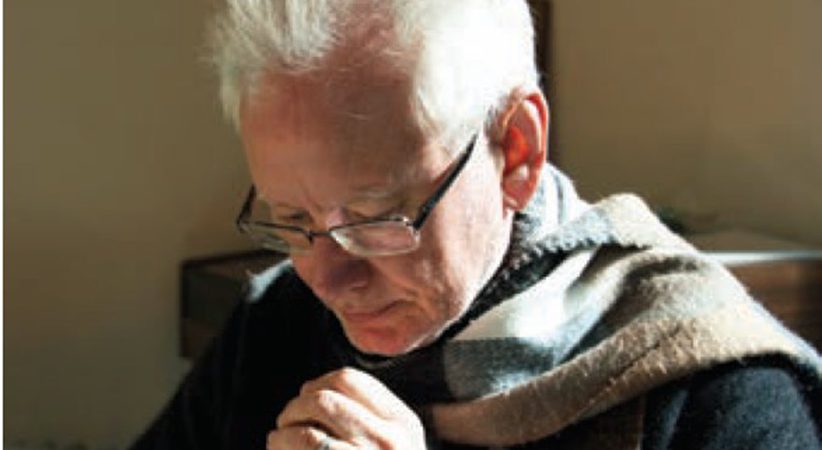Fr. Boniface Ramsey: Feeling Helpless, but Not Hopeless

Founder’s Quote
October 25, 2018
A Prayer for Brother Priests, by St. Thérèse of Lisieux
October 25, 2018
Jesuit Father Richard Shortall prays at St. Patrick and St. Brigid Church in Cooranbong, Australia, in this 2016 photo. CNS photo/Fiona Basile
Though we hurt, Christ keeps us from falling into despair
Not so long ago, a priest friend of mine who knew of my interest in the early Church asked me if I could think of anything from Christian antiquity that might be as scandalous as what we have been experiencing in the Church of 2018 — battered by allegations of depravity and mendacity at the highest levels. I managed to come up with the election of Pope Damasus, who became bishop of Rome in 366.
While Damasus was being elevated to the papacy by his partisans in one Roman basilica, a certain Ursinus was being elected to the same office by his partisans in another. The riots that ensued, which were said to have been engineered by Damasus, killed 137 people. Ursinus eventually was hustled out of Rome, and history has declared him an antipope, but Damasus’ reputation — not enhanced by allegations of adultery — permanently was damaged.
I think, though, that what has happened in the past few months has been worse for the institutional Church than the election of Damasus and its tumultuous aftermath, or than the so-called pornocracy of the 10th-century papacy, or than the flagrantly immoral activities of several Renaissance popes, to cite some of the more appalling moments in Church history — and to say nothing of some of the many misguided but nonsalacious policies and practices that the institution espoused to its detriment. None of that involved the sexual abuse of children. And none of that involved me.
Blowing the Whistle
As many who have been following the case of Archbishop Theodore McCarrick over the past several months, I am the whistleblower who, in the early summer of this year, succeeded in finally exposing Archbishop McCarrick’s extremely inappropriate behavior with his seminarians during the time he was archbishop of Newark, New Jersey. As outrageous as his behavior was — and, at the time, I knew nothing of his alleged abuse of minors — equally outrageous, if not more so, was the fact that it was an open secret in the seminary (where I taught) and evidently was quite well-known outside the seminary, even among many of McCarrick’s fellow bishops. None of this seemed to have had a negative effect on McCarrick’s ascent within the hierarchy, all the way to a red hat.
It would be incorrect to say that from the late 1980s to the present I was courageous in bringing up McCarrick’s bad behavior to people who could have done something about it. In fact, I never really felt threatened, and so it can’t be said that I was courageous in the face of perceived danger. I acted out of anger and disgust at McCarrick’s hypocrisy, but also out of bewilderment at the fact that so many knew that, at the very least, he was engaging in some kind of sexual harassment of his seminarians and no one did anything. As I write this, the anger and disgust and bewilderment return. For refusing to confront the well-known scandalous activities of one of its most prestigious members, I am tempted to say that the Church finally received the humiliation that it deserved.
The Bride of Christ
Still, I love the Church, and in my mind the beautiful New Testament image of the Bride of Christ is what most comes to the fore when I think of the Church that I love. And so I was deeply touched when I listened to Rick Warren, the noted evangelical pastor, talk to the clergy of the New York archdiocese this past June, just two weeks before McCarrick’s sins were exposed. He spoke with tears in his eyes of loving and never wanting to hurt the Bride of Christ by committing the very sorts of sins that McCarrick was alleged to have committed. It was reassuring to me that an evangelical pastor could invoke so emotionally an image that I had thought of as particularly Catholic.
A Prayer for Brother Priests |
|---|
O Jesus, eternal Priest,
|




